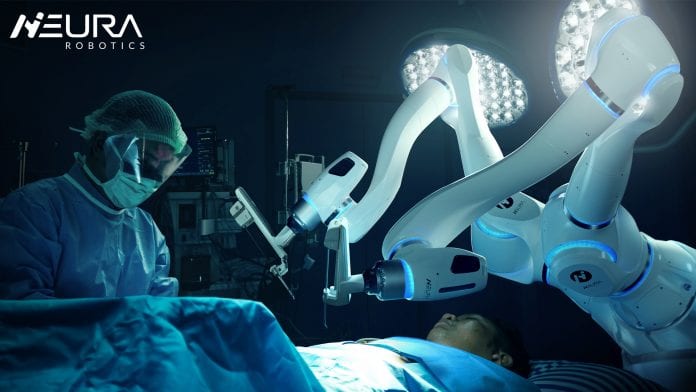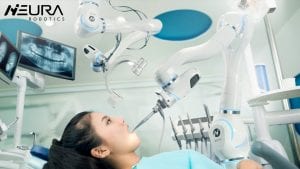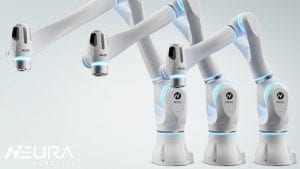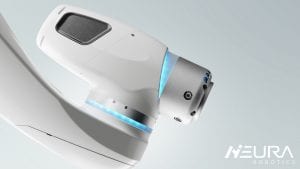
NEURA Robotics introduces an innovative robotic assistant with the potential to transform clinical care.
The data which shows that robot-assisted procedures accounted for 15.1% of all general surgeries in 2018, up from 1.8% in 2012,1 is an indication of two things:
1) Humanity is slowly beginning to trust robotics systems more; and
2) Robot-assisted procedures are becoming more accessible.
In the long term, integrating robotics into surgical procedures will result in a more enhanced healthcare system: we would be able to perform more complex surgical procedures, and as a result, save more lives. But this change would also require a pivot in the educational system. In order to sustain a high standard of performance using the existing solutions on the market, doctors would need to understand the basics of robotics; otherwise a more intuitive navigation system will be required.
In addition to the rise in surgical robots, there has a rapid increase in the overall implementation of robotics applications in healthcare. The COVID-19 pandemic has shifted the way robots are perceived – now they can be involved in patient screening, surface disinfection, positioning of medical devices and distribution of medicines, while keeping nurses and doctors safe from infection.
Taking all the above into consideration, the robotic assistant MAiRA from German company NEURA Robotics would be a perfect fit for the healthcare industry, thanks to a completely safe human-robot interaction system, intuitive navigation, Artificial Intelligence (AI) and flexible system architecture.


NEURA Robotics
NEURA Robotics is a high-tech robotics company which is poised to usher the way into the cognitive era by building intelligent robotic assistants which provide needed support to humans and focus on solving society’s most pressing issues, such as the ageing society. The company’s leader and CEO, David Reger, is one of the pioneers in the collaborative robotics field. Reger has amassed over nine years of experience in developing and introducing one of the most intelligent, sensitive and precise collaborative robot (cobot) series on the market.
Reger firmly believes that global problems, like the ageing population and many others, can be solved by new types of robots. NEURA Robotics products are able to interact with humans in much the same way that people are used to interacting with each other. No complex programming or convoluted learning is required. As a robotics advocate and visionary, Reger aims to integrate robotics into day-to-day chores, not only covering industrial needs, but also transforming spheres like social care, medicine and – one day in the future – in everybody’s home.
At NEURA Robotics, the main belief is that humans should be able to do what is at the core of human nature. NEURA Robotics enables people to express their creativity and focus more on social interactions again instead of doing unhealthy and monotonous jobs, which is still very common throughout general society. Everything the company does is based on the slogan: ‘We serve humanity’.
Meet MAiRA
This ambitious vision led the team of about 50 talented engineers to create the innovative robotic assistant MAiRA. With fully integrated novel sensors and an unprecedented integration of Artificial Intelligence in control systems and applications, MAiRA is leading a new era of robots. The robust and rigid design combines the performance of a high-end machine with easy programming and infinite possibilities for interaction – both for beginners and experts. MAiRA tears down boundaries between humans and machines and brings them closer together for good.
MAiRA’s unique set of characteristics can be easily applied in many new spheres, such as the medical field. She is able to feel, hear and see her surroundings, meaning that her capacity to fully perceive the environment enables her to rapidly adapt to a dynamic environment while staying completely safe. This makes MAiRA a truly collaborative robotic assistant which can be easily integrated into the doctor-patient relationship.
MAiRA is capable of conducting and assisting with various complex medical procedures, either with professionals by her side or wholly autonomously. Thanks to the intuitive user interface, voice and gesture control systems, a doctor or a nurse will not need to spend days or weeks learning how to operate the robot; they can instead focus on the most important part: treating their patients and making sure that they get the required help and care.
To learn more about NEURA Robotics and MAiRA please visit the company website at www.neura-robotics.com or send an email to info@neura-robotics.com.

References
- Sheetz KH, Claflin J, Dimick J. 2020. Trends in the adoption of robotic surgery for common surgical procedures, JAMA Netw Open. doi:10.1001/jamanetworkopen.2019.18911
This article is from issue 17 of Health Europa. Click here to get your free subscription today.
























